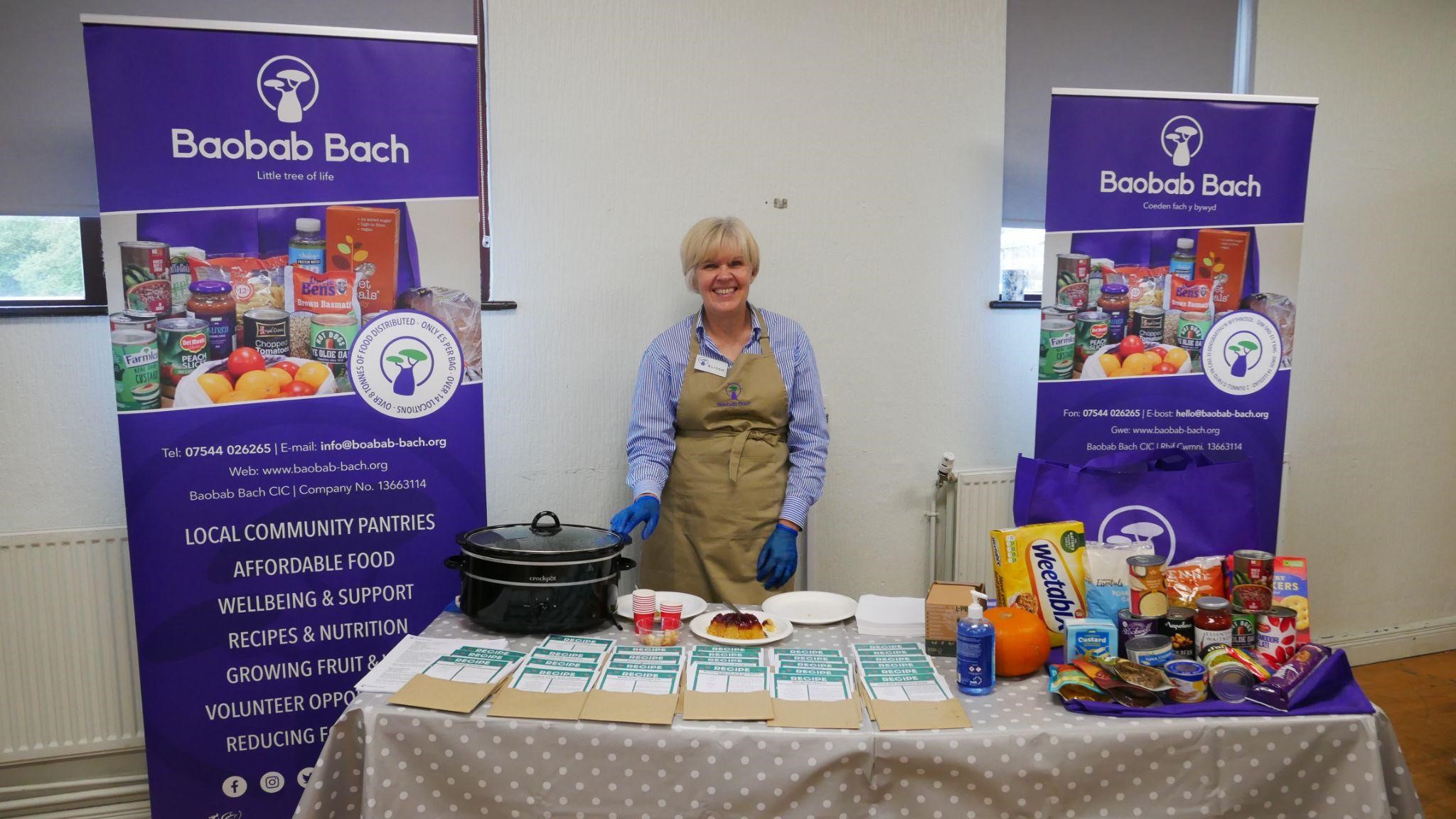
There’s always a ‘heart’ element to a social enterprise: for Baobab Bach, it’s affordable food, sanctuary, and support
Wales wastes on average 400,000 tonnes of food a year, 80% of it edible. Baobab Bach tackles that by sourcing still-fresh food (which would otherwise go to landfill) from Fair Share Cymru, and enabling people to access good food for not much money. In five years, Baobab Bach’s 6 members of staff and over 100 volunteers have supplied 46,868 bags of non-means tested quality food to approximately 270 families a week. They’ve achieved that through their 14 community pantries based in three counties in south Wales.
Each bag costs £5. Sometimes it includes smoked salmon, sometimes steak, sometimes less luxurious food – but it’s always worth at least £15. Membership of the pantries costs just £1. Bridgend, like many counties within Wales and the wider UK, is home to people who are struggling with the cost of living. Many live on a relatively low income. Making ends meet can be a challenge.
People don’t necessarily need food banks or food vouchers. Often, they just need an affordable source of food.
“Paying for what you need grants people a sense of pride”, says Alison Westwood, Director of Baobab Bach.
“Anyone can come along to our community pantries. We don’t ask for any evidence. We don’t means test anyone. Everyone is welcome.
“It’s so important not to judge. We serve everyone who comes through our door.
“People may dip in and out of our community pantries, or they may use them every week.
“At the end of the day, if circumstances happen in those unfortunate ways that they often do, any of us could be short of money at the end of the month.”
The baobab is an African tree. It provides a nutritious fruit, and also a source of water in the tree trunk. Baobab trees have a huge network of roots under the ground. They last thousands of years. As they age, they often hollow out in the middle, and the community baobab tree then becomes a place for people to meet, sing, and tell stories.
Alison continued:
“The baobab tree symbolises everything we want to do – feeding people, and offering a network of social support.
“So the baobab tree became our icon, and gave its name to Baobab Bach.
“‘Need’ can mean different things to different people. Sometimes it’s social need which brings customers to the pantries – what they really need is a cup of tea and a chat.”
And that’s an important part of the panties: they also tackle well-being issues.
“After Covid, social isolation was a huge issue. People were afraid to go out, and ended up feeling terribly isolated.
“The community pantries offer an opportunity to meet and socialise, a space for a cuppa and a chat, as well as a place for signposting to support groups. Some people don’t even choose to buy food: they use the pantries as a place to catch up, and to find out about local support services they might not know about, or be able to access otherwise.
“We also provide a home delivery service for food bags. Our van crew offer a source of support to people in the community – a food delivery service, a friendly face, companionship, and a means of passing information and emergency notifications to the appropriate professionals.”
As well as community pantries, Baobab Bach runs three growing projects. These are spaces where young people from local schools and youth clubs, or who are not in education, employment or training (NEET), can learn to grow their own food, and be part of the process of growing produce for their local pantry and helping their community.
“Shared Prosperity Fund (SPF) funding from Bridgend County Borough Council (BCBC) has given us the opportunity to build raised beds for our growing projects. We’re hugely grateful. This support will make a massive difference.
“It’s a huge investment, which will make the sites much more manageable and easier to cultivate. In the past, we’ve had problems with flooding, so having the funding to build raised beds has been transformational.
“Cwmpas has helped with Baobab Bach’s management structure, strategic planning, funding bids, training sessions, and opportunities for networking.
“It is so important to access quality support. There are things on an organisation level which we simply don’t know, but having an adviser with an external viewpoint and specialist advice is so valuable. Take that advice. It is very worthwhile.
“Baobab is a profitable organisation with a social purpose. That’s the best thing about social enterprise: being able to support people in the local community as part of what we do.
“Social enterprise adds so much beyond profit and loss. It is so much more satisfying to tackle social challenges and make people’s lives better.
“Our volunteers are the lifeblood of Baobab. Week after week, year after year, they are dedicated and reliable. They love what they do. I can’t find the words to express how brilliant they are. We couldn’t do what we do without them.
“At our heart, we are community-led. We listen to what communities say.
“We supply a year round social space for people to have a laugh and a natter, and a social support service, as well as boosting well-being, tackling loneliness, helping people back into employment, training them to grow and produce their own food, and giving them pride back in their ability to feed their families.
“How valuable is that!”









